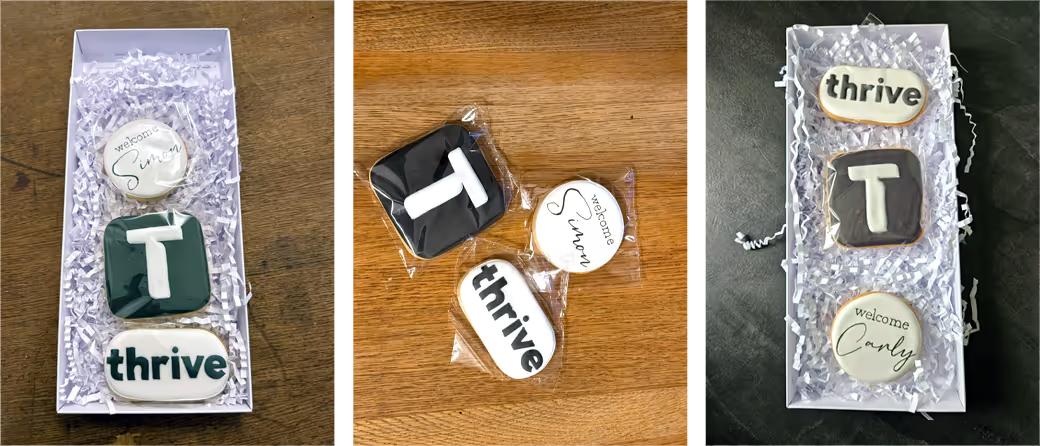How to make employee onboarding easy
Employee onboarding can be daunting, both for new starters and their managers. So how can you make it easy, smooth and even fun? Here are five steps.

How can you make employee onboarding smooth, easy, and enjoyable?
To state the obvious: Joining an organisation as a new starter is intimidating. You have to adjust to a brand new company, new people and a new culture – all while trying to quietly get the lay of the land. How does everything work? What are you actually supposed to be doing? Are you allowed to use that extremely expensive-looking coffee machine in the kitchen, because nobody else seems to be touching it?!
Whether new starters are trying to learn the company’s systems, adjust to the office’s unique atmosphere, or wangle a shot of bean-to-cup espresso, it’s your job as their employer to make sure they are brought up to speed as quickly - and thoroughly - as possible.
Just like joining a company as a new starter, onboarding that new starter can be equally intimidating. It’s no small task making sure that all the necessary training and introductions are given, while also making sure they feel welcomed and included, while also trying not to seem like you’re spinning a thousand plates at once.
So how can you make onboarding feel easy – both for yourself, and your new starters? Here are our five top tips, separated into an easy-to-follow timeline.
1 - 2 weeks before start date:
1. Preparation is key
Not to sound like a vintage boy scout, but the motto “Be Prepared” applies perfectly here. The key to making anything easier, more straightforward and less stressful is preparation. (Whether that’s camping in the woods, or training a new employee.)
By prepping as far in advance as possible, you’ll avoid any hiccups and difficulties further down the line. As soon as the contract has been signed, get the wheels in motion for your new starter’s first day on the job. Every company is different of course, but our handy five-point checklist below can be used as a bit of a general jumping-off point.
- IT and workspace set up: Order the necessary IT equipment or materials, get them set up on the various systems they’ll be using, and get their workspace ready (if they’re an in-person hire.)
- Prepare training materials and onboarding documents: Obviously as a Learning Management System for business we’re a bit biased here, but this is arguably the most important step in the onboarding process. The “learning” part of onboarding introduces the new starter to everything they need to know in order to truly understand the organisation. Prepare the necessary training materials, resources and documents you need – whether those are physical, digital, or a mix of both.
- Schedule introductions: As we’ll discuss in a later section, it’s important for new starters to be introduced to the people they’ll be working with every day (as well as the people who make up the wider company.) Schedule these meetings in advance, so that they’re already firmly established in everyone’s calendars. This will make for a much smoother first day and week.
- Complete HR tasks: As well as the more face-to-face, foreground tasks, the practical background tasks also need to be ticked off the list in preparation for the first day on the job. Payroll, benefits, processing the contract… all of the HR tasks need to be ticking along in the background ready for the new starter to begin.
- Create an easy-to-follow induction document for your new starter: We can’t overstate how much simpler this makes things – for both you, and your new starter. Create a document outlining tasks and expectations for the first 5 - 6 weeks of their role; this can include any accounts they need to set up, training they need to do, and tasks they need to complete. Remember how nerve-wracking the first few weeks on the job can be? How much easier would it be to literally have a step-by-step “manual” of sorts to orientate you, and assure you that you’re doing what you’re supposed to be doing?
1 week before start date:
2. Balance company-wide and role-specific training
Roughly one week before the new starter’s first day, arrange both company-wide and role-specific training.
Uniformity is your friend when it comes to employee onboarding. Be consistent with your onboarding process, so that everybody - no matter their level, role, or department - receives the same important information. This might include the company’s history and values, compliance training, and anything else you feel is essential for every single new employee who walks through your doors (whether physically or remotely.)
As we said, uniformity is key – but that uniformity should also be broken up with department and role specific training, helping your new starter get settled into their individual responsibilities and understand how they fit into the wider department.
So how do you balance these two needs?
The power and convenience of a digital learning platform can’t be overestimated in this situation. With a Learning Management System like Thrive, you can create a general onboarding pathway for all new starters and a more specific onboarding pathway for individual roles and departments – meaning that everyone gets the full picture.
The first day:
3. Facilitate connections
We probably don’t need to tell you that onboarding is not just the simple act of learning how to do a job; it’s fully welcoming someone new into your company and everything that comes along with that. Part of that “welcoming” process is forming connections – not merely with the people they’ll be working with every day, but with people from every department.
We hate to keep tooting our own horn (who are we kidding, we love tooting our own horn) but here at Thrive we’ve recently taken our own advice with a brand new onboarding programme for all new starters.
This programme, spread out over the course of several weeks, helps people ingratiate into - and learn about - the company with a series of sessions with department heads across the business. It’s an opportunity to learn about what each department does, understand how it fits into the wider business, and ask any questions about how it all works.
4. Don’t neglect compliance training
As we speak in this blog about the importance of company culture and getting to know people on a personal level, we want to make sure we also emphasise the importance of compliance training.
We actually have an entire blog about how compliance training is the key to safeguarding your company in today’s world, and a guide on how to incorporate it into your onboarding process. (It’s just that important.)
Even though this is a blog about making onboarding easy, part of that process is making it safe so that everyone can relax and focus on helping the new starter get settled into the role.
One week in:
5. Make it interesting
Essential elements of “ease” are fun and joy.
Now, we appreciate that the sentiment “make work fun!” is a bit of an oxymoron. Of course, you want work to be enjoyable, but it is still work at the end of the day – and you certainly don’t want your new starter to feel as though they’ve been roped along on some kind of insufferable, mandatory fun parade. (Looking at you, cringe-inducing icebreaker exercises.)
All we’re talking about here is making the onboarding process just that tiny bit more enjoyable, easy and welcoming.
One way to do this is with some kind of onboarding package. Obviously with this point we’re not talking about mandatory onboarding materials like company handbooks and essential training. Going beyond that, how can you inject some joy and, dare we say fun, into the package new starters receive?
At Thrive, we send new starters a package of (genuinely really delicious) branded biscuits with their name on, courtesy of Polly Anne Confections. It’s a great way to introduce them to the company, add a personal touch, and make them feel welcome.

Another idea is some kind of company social event. Again these should be very low-pressure, optional events to help new starters get to know their team in an informal environment. Think a group dinner, drinks (with non-alcoholic options) at a local pub, or even a casual coffee morning.
We hope you’ve found our guide to easy onboarding helpful! If you’re looking for an LMS that will make the entire process even easier - and continue helping employees throughout their entire careers - book a Thrive demo today.

